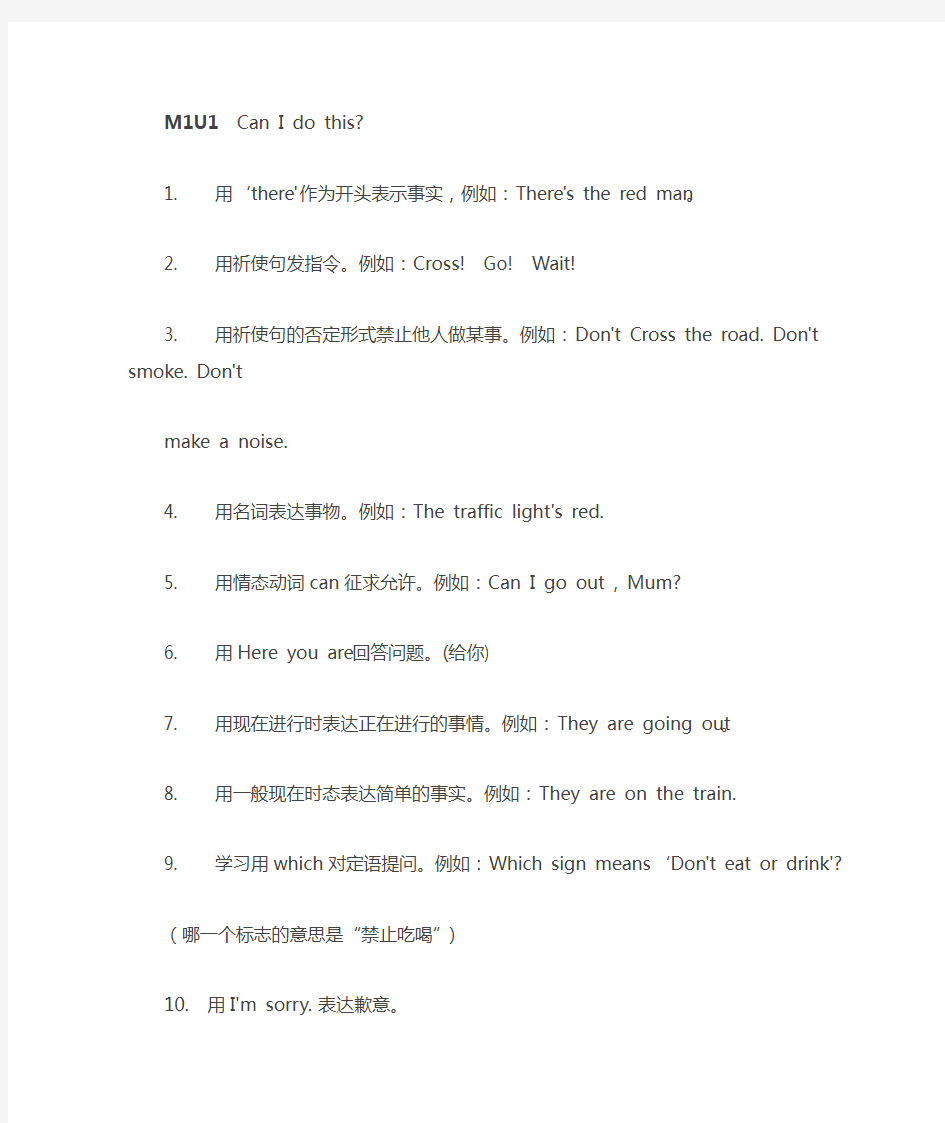完整沪教牛津英语五年级上册知识点归纳


M1U1 Can I do this?
1. 用‘there'作为开头表示事实,例如:There's the red man。
2. 用祈使句发指令。例如:Cross! Go! Wait!
3. 用祈使句的否定形式禁止他人做某事。例如:Don't Cross the road. Don't smoke. Don't
make a noise.
4. 用名词表达事物。例如:The traffic light's red.
5. 用情态动词can征求允许。例如:Can I go out , Mum?
6. 用Here you are回答问题。(给你)
7. 用现在进行时表达正在进行的事情。例如:They are going out。
8. 用一般现在时态表达简单的事实。例如:They are on the train.
9. 学习用which对定语提问。例如:Which sign means ‘Don't eat or drink'? (哪一个标志的意思是“禁止吃喝”)
10. 用I'm sorry. 表达歉意。
11. 在否定句中用or代替and。例如:Don't eat or drink.
M1U2 This is what I want
1. 用What do you want ? 询问“你想要什么?”
2. 用I want…表达要求。例如:I want some paper.
3. 学习用Here's /Here are …表达“给你……”。
4. 用Thank you very much.表达感谢。
5. 用形容词修饰东西。例如:a large Coke (一大罐可乐)
6. 用情态动词can征求许可。例如:Can I have some fish, please?
7. 学习关于菜的名称。例如:noodles、vegetables
M1U3 This is what I need
1. 关于学习用品的单词。例如:books。
2. 用'What do you need for school ?' 询问“你上学需要什么?”
We need some paints.
。例如:......”我们需要“表达We need (3)
4. 用一般现在时表达想法。例如:That smells good. (闻起来真不错)
5. 用情态动词提出要求。例如:Can I have a bowl, please?
6. 用We have got …表达“我们有…”。例如:We've got some water.
7. 用but表示转折。例如:Kitty has a uniform but it is small.
8. 用现在进行时表达正在发生的事情。例如:They are looking at some uniforms.
9. 用形容词进行修饰。例如:It is cheap but it is nice.
M2U1 Me
1. 用一般现在时表达习惯的行为。例如:This is the way I wash my face.(这就是我洗脸的方式)
2. 在时间前用at表达。例如:at half past one in the afternoon (早中晚前用in the ,周几前用on。)
3. 用what time询问事情发生的时间。例如:What time do you get up ?
4. 用一般时态表达自己或者他人的作息安排。例如:I get up at six. Ben gets up at seven.(注意第三人称单数在一般时态中的变化。)
M2U2 What do you like?
1. 用Are you …? 询问“你…….?”及其回答Yes, I am.或No, I am not.
2. 用祈使句发指令。例如:Clap your hands.(拍手)
3. 用or连接的选择疑问句。例如:Is Kitty hungry or full?及其回答She is hungry.或She is
full。
4. Kitty, it's your birthday on Saturday.(Kitty, 星期六是你生日)
5. 用Which询问“哪个”。例如:Which bag does Kitty want? (Kitty想要哪个书包?)
6. 用I like 或I don't like …表达喜好。例如:I don't like the black one but I like the green
one.
7. 用Does Kitty like …? 询问“Kitty喜欢…吗?”及其回答Yes, she does.或No, she
doesn't.
8. 用but表示转折。例如:I don't like the green one but I like the yellow one. (我想要粉红色的那个)I want the pink one, please. 指定某一特殊物体。例如:9.
10. 关于食物的名称。例如:cabbage, carrots, sausages
11. 用What do you like?询问“你喜欢什么?”及其回答I like…“我喜欢……”,例如:I like rice.
M2U3 A birthday party
1. 日期的表达。例如:the fourth of February (二月4号)
2. 用When's your birthday?询问“你的生日是哪天?”
3. 在日期前用介词on。例如:My birthday's on the fourth of February.
4. 用序数词表达:twenty-first (第二十一)
5. 用Which …do you like? 询问“你喜欢哪个……?”及其回答I like that one.
6. 用What are you doing? 询问“你正在干什么?”
7. 用现在进行时表达正在发生的事情。例如:I'm making some cards. (我在制作卡片)
8. 用Do you want …or …? 表示选择,意思为“你想要…还是…?”
M3U1 My school
1. 用There is /are…表达“有…”。例如:There are two floors.
2. 用hundred“百”的表达。例如:There are a hundred children in my school.
3. 用how many 询问数量。例如:How many floors are there in your school?
4. 用时间的表达(具体时间前面用at )。例如:At a quarter to/past twelve we have our
lunch.
5. 用一般现在时表示习惯的行为。例如:I eat my lunch at 7 o'clock in the morning..
6. 用I like …表达“我喜欢…”。例如:I like Monday.
7. 用现在进行时表达正在发生的事情。例如:I am painting a picture.
8. 用一般现在时表达事实。例如:Eight children in our class go to school.
9. 用How do you go to …? 询问乘坐什么交通工具?回答:I go by tram. (其中步行用on foot = walk)
M3U2 Let's go shopping
1. 用I want 表达“我想要……”.例如:I want a new ball.
I want a new umbrella. That one's big.用指示代词和冠词进行修饰。例如:2.
3. 用how much询问多少钱。例如:How much money have you got ?
4. 表达钱币。例如:A¥50 note is green.
5. 用I have got 表达“我有……”。例如:I've got eighty yuan.
6. 用Which one?表达“哪一个?”
7. 用形容词修饰物品。例如:The big blue one.
8. 用Excuse me.表达“打扰一下”。
9. 用What's she buying?询问“她正在买什么?”及其回答She's buying some bread.
M3U3 Follow the signs!
1. 用祈使句的否定形式表达“禁止……”。例如:Don't jump into the pool.
2. 用It's dangerous. 表达危险。
3. 用'Which one means …?'表达“哪个表示……?”
4. Eddie and Danny like football.
5. 用She has …表达“她有……”。例如:She has a dog..
6. 用现在进行时表达正在发生的事情。例如:A boy is riding his bicycle here.
7. 用can't 表达“禁止……”。例如:You can't ride a bicycle here.
8. 用祈使句发指令。例如:Look at this sign!
9. 用Why not?询问理由。(为什么不?)
10. 用适当的介词表示地点。例如:They are going to North Park by bus.
M4U1 Wild animals
1. 用一般现在时态表达事实。例如:Some monkeys live in the jungle.
2. 用can表达“能,会”或can't表达“不能、不会”。例如:It can swing on the rope.
3. 用现在进行时表达正在发生的事情。例如:This one is eating a banana.
4. 用Does it eat…?询问“它吃……吗?”及其回答Yes, it does.或No, it doesn't.
5. 用like 表达喜好。例如:I like monkeys.
No, it can't.或Yes, it can. 及其回答”吗?……长颈鹿能“询问Can a giraffe…? 用6.
7. 用Where 询问地点。例如:Where does it live?
M4U2 Butterflies
1. 用What's that? How do you spell that in English?询问“那是什么?你用英语怎么拼?”
2. 用形容词修饰。例如:It's beautiful.
3. 用I don't know .表达“我不知道”。
4. 用一般现在时表达事实。例如:It lays some eggs on a leaf.
5. 用like 表达喜好。例如:I like butterflies.
6. 用Which one do you like ?询问“你喜欢哪一个?”
7. 用and连接并列关系。例如:I like the red and yellow one.
8. 用but进行转折。例如:I like the…one but I don't like the …one. M4U3 Parks and places in China
1. 用一般现在时表达事实。例如:I don't know this place.
2. 用介词表达在某个地方。例如:It's in Shanghai. It's on Hainan Island.
3. 表达地名和地方。例如:That's the Li River.
4. 用情态动词进行请求。例如:Can we see the dolphins?
5. 用形容词进行修饰。例如:I'm hungry.
6. 用一般将来时表达将要发生的事情。例如:Janet and Simon are going to Ocean Park.
7. 用where询问地方。例如:Where are Janet and Simon going?
8. 用who 询问“谁”。例如:Who is the man?
9. 用what询问“干什么”。例如:What is he doing?
